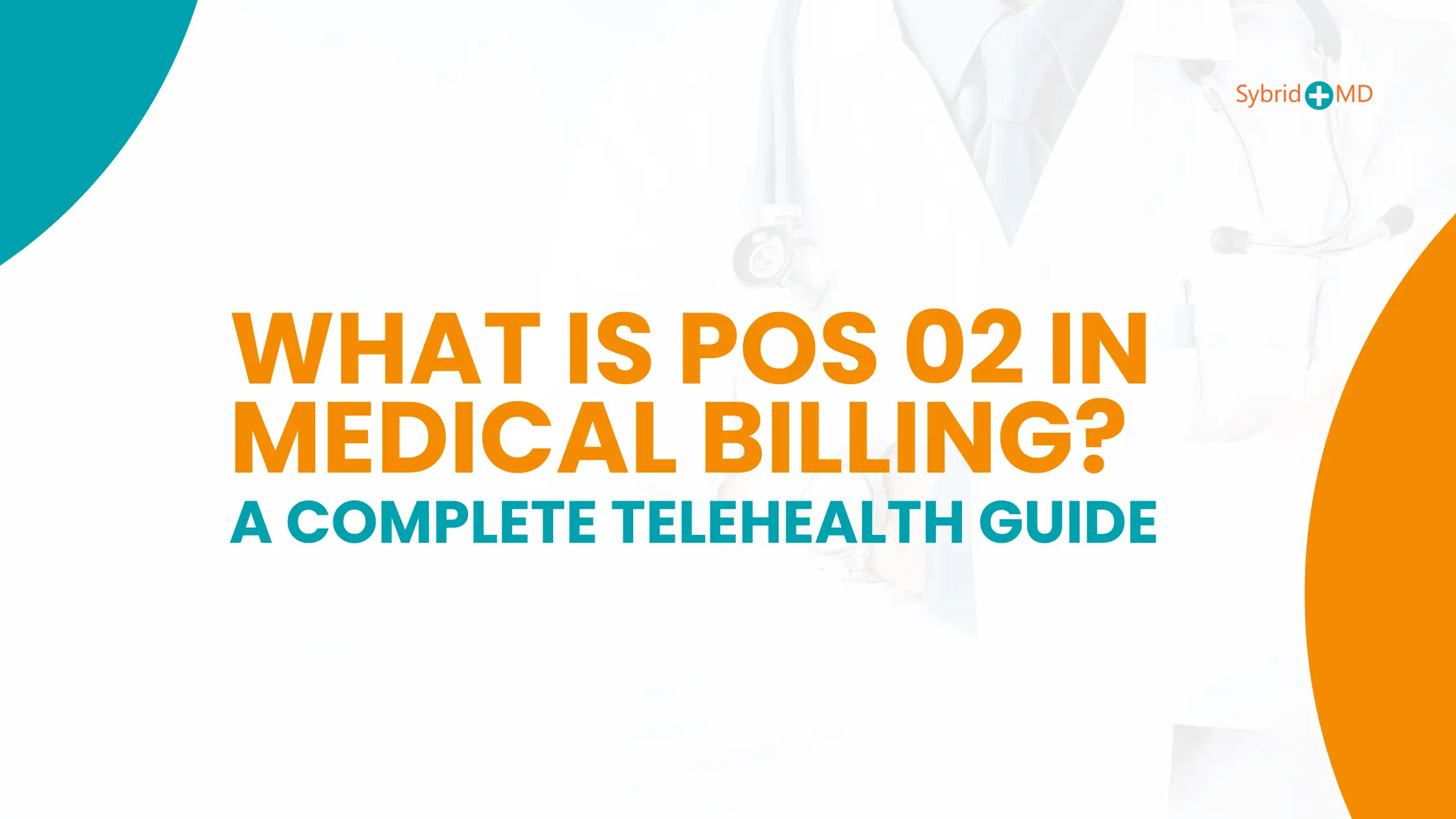POS codes indicate locations that medical services are provided. This article describes POS 02 in business, explains medical billing, and lists other important POS codes, which are used in healthcare claims.
POS in Medical Billing
POS in medical billing is very important as far as accurate coding and reimbursement are concerned. POS codes explain where the medical service was provided, which influences claim approval, compliance, and payout rate in insurers. Whether POS 11, POS 15, or POS 02, or POS 23, each POS code tells a different story, and there’s no mistake that healthcare providers will be paid for the work rendered.
To conclude, appropriate use of POS 02 in medical billing is a part of the telemedicine which is rather important when the services are provided outside the patient’s house, though remotely. Its correct usage will have a regulatory compliance impact and will shape the reimbursement structure making it a vital concept to master for medical billers and providers.
What Is POS 02 in Medical Billing?
In medical billing, the two digit codes on health insurance claims are known as Place of Services (POS) codes which give the service location. Such codes are used by the insurers to establish the reimbursement rates that can be allocated depending on location of service. POS 02 among myriads of POS codes in the medical billing area is very important in identifying telehealth rendered services.
What Does POS 02 in Medical Billing Mean?
POS 02 is Telehealth provided other than in Patient’s Home. It is used in situations when a healthcare provider provides services using telecommunication (audio and video) to a patient who does not reside in the patient’s home—for instance, he or she may be attending a clinic, a community center, or a school being remotely accessed.
Such code assists insurance companies in determining what different types of telehealth services were provided, particularly following the rollout of POS 10 that which is now used when the patient is at home during the telehealth encounter. POS 02 was widely applied for all telehealth services before POS 10 was established. Now, POS 02 has a smaller definition and can only be used when the patient is not home.
Why Is POS 02 Important?
Correct use of POS 02 ensures:
- Payer policy and CMS (Centers for Medicare & Medicaid Services) compliance.
- Prevention of claim denials arising from incorrect service location classification.
- Different from in-person care or home-based telehealth care (POS 10).
Telemedicine is becoming more common, the correct POS codes are indispensable for being able to bill and get compensated seamlessly.
POS 02 vs POS 10 – Key Differences
| Feature | POS 02 | POS 10 |
| Description | Telehealth provided other than in-home | Telehealth is provided in the patient’s home |
| Patient’s Location | Clinic, office, school, etc. | Patient’s private residence |
| Use Case | Remote consultation at non-home locations | Remote consultation from home |
| Reimbursement | Typically different rates from POS 10 | May qualify for separate reimbursement |
Related POS Codes in Medical Billing
For telehealth, POS 02 in the medical billing process is equally important to have a holistic and compliant billing process. Here is a paragraph containing all the rest of your needed keywords, written naturally: …
Medical billing has different POS codes such as POS 11 in medical billing and that is services in a physician’s office and POS 15 in medical billing indicating a mobile unit like a traveling clinic POS 20 in medical billing is applicable for urgent care centers and POS 21 in medical billing is used for inpatient hospital care. Emergencies are billed under POS 23 in medical billing, and outpatient settings, surgeries are billed with POS 24 in medical billing, i.e., Ambulatory Surgical Centers. Each of these, including POS 02 for medical billing, has a specific job to ensure that the correct setting is conveyed for reimbursement.
Common Billing Scenarios for POS 02
- Remote Specialist Consultation: A neurologist conducts a video consultation of a patient in a local clinic. There is video gear in the clinic, but the neurologist is in another city.
- School-based Telehealth: A pediatrician consults with a student who is in school and has a nurse as an assistant. The POS 02 in medical billing is applied due to the reason that student is not at home.
- Workplace Telehealth Session: A telehealth service is accessed by an employee from their office building through secured video conferencing for a mental health check-up.
Best Practices for Using POS 02
- Check the precise point where the patient was during the provision of service.
- If the patient is found at home, use POS 10 rather than POS 02.
- Double-check payer-specific rules, as private insurance companies may have extras.
- Documenting the location in the medical records will help the pertinent use of POS 02 upon audit.
POS 11 in Medical Billing – Office
POS 11 in medical billing is a physician’s office, and it is one of the most commonly used POS codes in medical billing. It means that the healthcare service was offered in a clinic or office. This is the traditional direct visit place, where routine examinations, diagnostics, follow-ups, and other standard services are performed.
POS 15 in Medical Billing – Mobile Unit
The use of POS 15 in medical billing is to indicate a mobile unit, eg, a van or mobile clinic. In industry, these units are particularly useful in rural or underserved areas, providing services such as immunizations, dental care, or health screenings. The use of POS 15 provides for billing for services that are provided in services in a vehicle that travels from site to site to treat patients.
POS 20 in Medical Billing – Urgent Care Facility
POS 20 in medical billing is intended for urgent care facilities that help walk-ins in and get treated for less serious conditions, such as minor injuries, flu, or infections. It sets these services apart from other services provided in emergency departments or primary care offices, and it influences the way insurance providers assess and reimburse the claim.
POS 21 in Medical Billing – Inpatient Hospital
POS 21 in medical billing shows that the service was carried out in an inpatient hospital. It is an application used if the patient has been officially admitted to the hospital for more than one overnight stay, or if the patient has left the patient’s office building but has not yet been admitted to the hospital or entered into the system for outpatient care. This code must be used by the providers when billing for care that requires intensive monitoring, surgeries, or observation over a longer period.
POS 23 in Medical Billing – Emergency Room (ER)
POS 23 is the delivery of services in a hospital emergency room. This code is withdrawn for claims with incidences of emergency medical conditions that have to be addressed immediately. It is important for providers to use POS 23 to be sure that claims are processed under emergency billing.
POS 24 in Medical Billing – Ambulatory Surgical Center (ASC)
POS 24 in medical billing is used for services provided in an Ambulatory Surgical Center, which is a place that offers outpatient surgical procedures which need not require overnight stays. ASCs are less expensive than inpatient surgeries and have a variety of minor to moderate surgical procedures.
Conclusion
Placement of accurate Place of Service (POS) codes in medical billing is worth mentioning as it is essential for correct claim submission, timely reimbursement, and compliance with regulations. From telehealth service outside the home for POS 02 to POS 11 for office visits and POS 23 for emergency care, each code has an important part to play in the billing process. As the health care delivery continues to grow with telemedicine and mobile care units, continuing to learn about the proper use of POS codes results in fewer claim denials, well-documented, and an easier revenue cycle for both the providers and billing teams.
Frequently Asked Questions
Q1: What is the purpose of POS codes in medical billing?
POS codes show the location at which healthcare was provided hence, insurers use them to define coverage and reimbursement rates.
Q2: What is the number of the prominent POS codes?
There are dozens of POS codes, however, POS 02 (telehealth not at home), POS 11 (office), POS 20 (urgent care), POS 21 (inpatient hospital), POS 23 (ER), and POS 24 (ASC) are commonly used.
Q3:What is the difference between POS 02 and POS 10?
POS 02 is always used for telehealth when the patient is not at home, while POS 10 is used when the patient is at home.
Q4: Can more than one POS code be used for one claim?
Normally, one POS code is assigned to a claim line item depending on where the service was provided. Nonetheless, more than one service offered during one visit will need different POS codes for the same claim.

